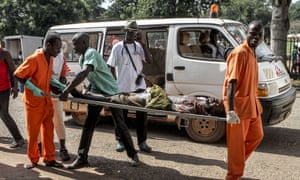
A wounded man is carried into the hospital in Bangui. Photograph: Getty Images
At least 21 people have been killed in Bangui on Saturday and about 100 others wounded as Muslims attacked a mainly Christian neighbourhood, a government spokesman said.
The reprisal attack in the capital of Central African Republic comes after a Muslim man was killed and his body found dumped in a street close to the airport.
Muslims left their stronghold in the third district of Bangui and attacked the largely Christian fifth district using automatic guns, heavier weapons and grenades.
The Voice of Peace Muslim community radio station and a church in the fifth district were among the buildings targeted. Thousands of residents fled to other parts of the capital and attackers who wielded machetes and knives burned houses and cars.
UN helicopters with a peacekeeping force flew overhead but witnesses said little was done to stop the clashes.
The security minister, Dominique Said Paguindji, blamed the violence on elements of the anti-balaka Christian militia, the Muslim Séléka rebels and supporters of the former president Francois Bozize, who want to see him return to power.
“These armed groups don’t subscribe to a logic of disarmament and want to split the country,” he said. “All of these people have the same interest in wanting to see the transition ruined and the coming elections halted.”
The religious and ethnic unrest, which erupted after Muslim Séléka rebels seized power in the majority Christian country in 2013, has left the country divided. Two years of violence in the landlocked country has killed thousands of people and forced many more to leave their homes.
There had not been any attacks in Bangui for months until a grenade attack earlier in September. This latest conflict is the worst violence this year in a city secured by French and UN peacekeepers.
Voters are due to elect a new president and parliament on 18 October to replace an interim government led by Catherine Samba-Panza. Preparations are lagging and the head of the interim parliament said the polls will likely be postponed again.
Some analysts say elections should be delayed to allow transitional authorities to make more progress on disarmament.

No comments:
Post a Comment